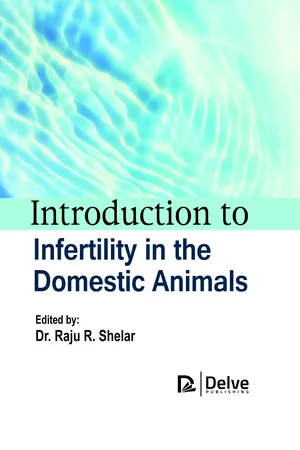
- 255 pages
- English
- PDF
- Available on iOS & Android
Introduction to infertility in the domestic animals
About this book
Reproduction is a vital component in the animal husbandry practices. Infertility is a significant concern in domestic animals, as it can impact breeding programs, animal productivity, and the overall health of animal populations. Infertility in domestic animals refers to the inability of an animal to reproduce successfully, either by conceiving, carrying a pregnancy to term, or giving birth to healthy offspring. It can also affect various species of domestic animals, including cattle, horses, sheep, goats, pigs, dogs, cats, and more. It is a significant concern for animal breeders, farmers, pet owners, and veterinarians, as it can have economic, emotional, and practical implications. Infertility can have various causes, including genetic, anatomical abnormalities, age, physiological, endocrine disruptions, nutrition, infections and diseases, environmental, and management factors. Some animals may inherit genetic traits that can lead to reproductive problems, such as structural abnormalities or hormonal imbalances that affect their fertility. Physical abnormalities in the reproductive tract, such as uterine malformations or blocked fallopian tubes, can prevent successful conception and pregnancy. The age of the animal can impact fertility. Older animals might experience reduced reproductive capacity due to changes in hormonal balance and overall health. In females, conditions such as ovarian cysts, uterine infections, and blocked fallopian tubes can lead to infertility. In males, problems like low sperm count, poor sperm motility, and anatomical abnormalities can contribute to infertility. Hormonal disorders, like those affecting the thyroid or reproductive hormones, can disrupt normal reproductive cycles and processes. Exposure to endocrine-disrupting substances, like certain pesticides or pollutants, can interfere with hormonal regulation and reproductive function. Inadequate or imbalanced nutrition can impact an animal's reproductive health. Both under nutrition and excess nutrition can lead to fertility issues. Certain infections, such as sexually transmitted diseases or reproductive tract infections can directly affect reproductive organs or disrupt hormonal balance, leading to infertility. Environmental conditions can have a significant impact on reproductive success. Stress, extreme temperatures, poor housing conditions, and exposure to certain chemicals or toxins can negatively affect fertility. Improper breeding practices, such as overbreeding, or inadequate timing of mating or AI, can lead to reduced fertility. Infertility diagnosis in domestic animals involves a combination of physical examinations, clinical evaluation, reproductive history, and various diagnostic tests, such as hormone level assessments, ultrasound imaging of reproductive organs, and semen analysis in males. Veterinarians will work to identify the underlying cause of infertility in order to develop an appropriate treatment and management strategies. An infertility management strategy involves maintaining optimal reproductive health through balanced ration, suitable housing, disease prevention measures, and stress reduction. Judicious hormonal therapies, surgical interventions, implementing proper breeding practices, and assisted reproductive techniques like artificial insemination or in vitro fertilization can be employed to address specific issues. In conclusion, infertility in domestic animals can have a substantial impact on agricultural productivity and breeding programs. It's important to note that infertility can be a multifaceted problem, often requiring an understanding of the causes, along with appropriate management, veterinary care, and, in some cases, advanced reproductive technologies. Addressing infertility requires focusing on the health and well-being of domestic animals, we can mitigate the challenges posed by infertility and ensure the sustainability of livestock production and companion animal populations.
Frequently asked questions
- Essential is ideal for learners and professionals who enjoy exploring a wide range of subjects. Access the Essential Library with 800,000+ trusted titles and best-sellers across business, personal growth, and the humanities. Includes unlimited reading time and Standard Read Aloud voice.
- Complete: Perfect for advanced learners and researchers needing full, unrestricted access. Unlock 1.4M+ books across hundreds of subjects, including academic and specialized titles. The Complete Plan also includes advanced features like Premium Read Aloud and Research Assistant.
Please note we cannot support devices running on iOS 13 and Android 7 or earlier. Learn more about using the app.
Information
Table of contents
- Cover
- Half Title Page
- Title Page
- Copyright
- About The Editor
- Table Of Contents
- List Of Figures
- Abstract
- Preface
- Chapter 1: The Reproductive System Of A Farm Animal
- Chapter 2: Estrous Cycle And Fertility In Domestic Animals
- Chapter 3: Fertilization And Conception In Farm Animals
- Chapter 4: Infertility In Male Domestic Animals
- Chapter 5: Anestrous In Domestic Animals
- Chapter 6: Non-infectious Infertility In Domestic Animals
- Chapter 7: Infectious Infertility And Abortions In Domestic Animals
- Chapter 8: Factors Influencing Infertility In The Domestic Animals
- Chapter 9: How To Improve Fertility In Domestic Animals
- Chapter 10: Artificial Insemination In Treatment Of Infertility In Domestic Animals
- References
- Index
- Back Cover